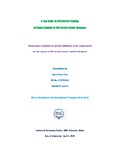| dc.contributor.author | Tun, Kyaw Swar | |
| dc.date.accessioned | 2019-01-22T09:33:51Z | |
| dc.date.available | 2019-01-22T09:33:51Z | |
| dc.date.copyright | 2018 | |
| dc.date.issued | 2018-03 | |
| dc.identifier.other | ID 17172013 | |
| dc.identifier.uri | http://hdl.handle.net/10361/11271 | |
| dc.description | This dissertation is submitted in partial fulfillment of the requirements for the degree of MA in Governance and Development, 2018. | en_US |
| dc.description | Cataloged from PDF version of dissertation report. | |
| dc.description | Includes bibliographical references (page 49). | |
| dc.description.abstract | The government servants are including in the important sectors to develop and be growth sustainably their country. Thus their competences always need to higher and training that making polish also always need to train for them. The men power that having the government servants push a country to develop and be growth sustainably but we must use the tools (ICT) having super power without leaving. Nations cannot make any headway in development if the standard of performance of civil servants is not ensured. Therefore, developing the ability of civil service officials is the core of all public sectors. So, utmost priority should be laid on the ability of civil service for attaining total development of the officials. A capable and committed civil service founded on the principle of integrity, impartiality and accountability is the backbone of democratic governance. Thus Dr. Win Thein, Chairman, Union Civil Service Board wrote preface for Civil Service Reform Strategic Action Plan for Myanmar 2017-2020 on 10th July 2017. “The Strategic Action Plan aims to introduce a new ethos and culture to the Myanmar Civil Service, to support the overall transformation of the country in a more effective manner. It is based on the premise that the civil service should become a ‘better place to be’ in order to be able to harness motivation and efficiency, but it should also become a ‘better partner to the people’ through more people-centered culture and engagement, and more transparent and accountable mechanisms and practices. . With similar view, civil servants of all ministries from the Lower Myanmar receives training in the Central Institute of Civil Service (Lower Myanmar)[ the CICS (Lower Myanmar)] under the supervision, control and guide line of the Union of Civil Service Board [the UCSB], Myanmar. Therefore, the aim of this research is to compare the old training courses and the new training courses particularly to see the differences between two types of courses. It also intends to do comparative analysis of effectiveness of both courses from by analyzing responses from the civil servants, teachers and officers who had finished the old training course and already attended or now the new training courses. In this research, the respondents are less because the junior civil service officers not only had finished the basic course for clerical staff in the previous training courses but also had finished the basic course for junior civil service officer in the current training courses. Beside the senior civil service officers not only had finished the basic course for junior civil service officer in the previous training courses but also had finished the basic course for senior civil service officer in the current training courses. So there are 50 respondents in the research but it is qualitative. Thus the scope of the dissertation is to find out the core facts of their views from two kinds of training courses which have a large public service effect. View of the research is also comparing the data provided by the institute in different conditions. In this research, we may find the facts making to redesign and reengineering about the subjects in the current training courses,
the facts redrawing to redesign and reengineering the training time duration, the facts taking to redesign and reengineering the teaching techniques, and the facts performing to redesign and reengineering to the current training courses to change the computerization. So we have to minimize the current training courses gaps. The policies of the institute should have specific targets to alleviate gaps. | en_US |
| dc.description.statementofresponsibility | Kyaw Swar Tun | |
| dc.format.extent | 49 pages | |
| dc.language.iso | en | en_US |
| dc.publisher | BRAC University | en_US |
| dc.rights | BRAC University dissertation are protected by copyright. They may be viewed from this source for any purpose, but reproduction or distribution in any format is prohibited without written permission. | |
| dc.subject | Myanmar civil service | en_US |
| dc.subject | Civil service training | en_US |
| dc.title | A case study on civil service training in Central Institute of Civil Service (Lower Myanmar) | en_US |
| dc.type | Dissertation | en_US |
| dc.contributor.department | BRAC Institute of Governance and Development, BRAC University | |
| dc.description.degree | M. Governance and Development | |

